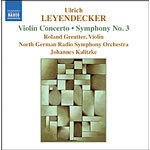
Violin Concerto / Symphony No. 3
 $25.00
Out of Stock
$25.00
Out of Stock6+ weeks add to cart
LEYENDECKER
Violin Concerto / Symphony No. 3
Roland Greutter (violin) / North German Radio Symphony Orchestra / Johannes Kalitzke, conductor
[ Naxos / CD ]
Release Date: Tuesday 14 June 2005
This item is currently out of stock. It may take 6 or more weeks to obtain from when you place your order as this is a specialist product.
"The artists give clean performances, with an extensive series of emotions brought through from the score. A immensely accurate rendering of the concerto is also provided by the soloist and dedicatee, Roland Greutter. The recorded sound is appreciably warm in the violin concerto, and (rather appropriately) a little more icy in the symphony."
(MusicWeb Jan 2006)
After 8th May 1945 everything was supposed to be different. Never again, swore the generation of artists born in the 1920s and early 1930s, who often enough had lost their own fathers, or, at least, their intellectual mentors. Never again should art and music bow under the yoke of tyranny, nor let itself again be misused as an aid to the reality of National Socialism in glossing over the worst atrocities.
Yet so long as humanity is incapable of drawing the right conclusions from its historical mistakes, from every 'never again' the exact opposite will come about, as is frighteningly clear to us from a glance at the music of the years after the war: hardly had defiant late-maturing backs been turned on the traditions and the Establishment responsible for the disaster in order to find inspiration and future perspectives in composers such as Schoenberg and Anton Webern, regarded for some few years as 'degenerate' - hardly, then, was the eloquent experimentalist reforming avant-garde born, than 'it had itself developed the symptoms of an Establishment. This manifested itself in an intellectual hardening of attitude, and, going hand in hand with that, in doctrinaire arrogance and repression towards 'deviators'. Thus many young composers through this pressure, seen, for example, in the demand that every prize must be 'new', were forced into sterility', wrote the composer and writer Hans Vogt a quarter of a century ago in his book Neue Musik seit 1945 (New Music since 1945) [2nd edition, Stuttgart 1982] worth reading now as before, a work that hits the nail on the head. He could only have topped this statement by denouncing the phenomenon that such gifted musicians as the young Hans Werner Henze found himself facing, as what it really was: a new kind of intellectual fascism.
Artists born after the war had again completely different possibilities. Certainly not everyone in this 'young' generation that today dominates the scene, would have admitted in the 1970s and 1980s that the avantgarde had long since become the rearguard. In this way many sensed their 'big chance' on the running-board of a train that in quick time would come to a halt against buffers on a remote sidetrack where few listeners would be found and where, in the course of time, there would be ever less in the form of subventions. Yet many others wanted again to find certainty from the spirit perceived in past traditions, turned to the old masters, wrote variations, permutations and reflections on Gesualdo, Mozart and Schubert, discovered for themselves the value of emotion, and even of euphony (often vilified by a gradually shrinking clique of phoney one-time revolutionaries). Others again succeeded in freeing themselves from the obsolete avant-garde and also from the new widespread desire for historical support and - successful through their creative individuality - entered upon a new path.
One of these is Ulrich Leyendecker, who was born in Wuppertal in 1946. From 1962 to 1965 he studied composition with Ingo Schmitt, then until 1970 with Rudolf Petzold at the Cologne Musikhochschule, where he also was a piano pupil of Günter Ludwig. Already in 1968 he had a scholarship from the German People's Study Foundation, and three years later became Lecturer in Theory at the Hamburg Academy for Music and the Performing Arts. In 1975 he received an award from the North-Rhine-Westphalia region. After a year's residence at the Villa Massimo in Rome he was appointed Professor of Composition and Theory at the Hamburg Music and Theatre Hochschule. In 1984/85 there was an award from the Cité Internationale des Arts in Paris, in 1986 he became a member of the Hamburg Free Academy of Arts, and in 1987 was honoured with the Von der Heydt Prize of the city of Wuppertal. Since 1994 he has been Professor of Composition at the State Hochschule for Music and the Performing Arts of Heidelberg-Mannheim, and since 1997 member of the Mannheim Free Academy of Arts. In 2001/02 he received a second award from the Cité International des Arts in Paris.
Tracks:
Violin Concerto
Symphony No. 3
